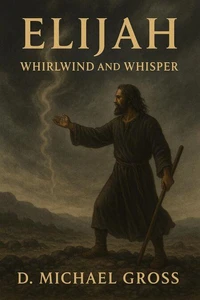Abraham did not start as a saint. He started as someone's son in a house that made idols. In a world crowded with gods and rituals, a scandalous Voice broke the silence and said one word that rearranged history: Go."Abraham: The Friend Who Walked into the Unknown" is a literary biographical theology that follows the patriarch from Ur's crowded temples to Canaan's open sky. With clear, muscular prose and reverent honesty, D.
Michael Gross treats faith as a verb, movement toward mystery, rather than a pile of pious slogans. You will walk with Abram through grief, obedience, famine, failure, bargaining, and promise. You will watch tents rise and altars stack, learn why the first altar to the unseen God was a revolution, and see how covenant changes a man who owns nothing yet lacks nothing. The book makes rigorous theology accessible and humane: monotheism is encountered before it is defined; grace chooses before merit can boast; obedience matures in the silence between revelations.
This is not a sanitized hagiography. Abraham lies in Egypt, hesitates in Haran, argues with God, and almost loses the son who embodied the promise. Yet through those fractures, the story glows. Faith is less about feeling certain and more about continuing anyway. The narrative balances historical texture with pastoral clarity, tracing how the tent, mobility, and the altar, memory, become the grammar of a life lived with God.
If you are weary of religious noise but hungry for the real thing, this book invites you to step into the dust of a man who learned to trust a God with no statue and no sales pitch, only presence. Abraham's footsteps still teach us how to leave, how to listen, how to trust, and how to repeat.
Abraham did not start as a saint. He started as someone's son in a house that made idols. In a world crowded with gods and rituals, a scandalous Voice broke the silence and said one word that rearranged history: Go."Abraham: The Friend Who Walked into the Unknown" is a literary biographical theology that follows the patriarch from Ur's crowded temples to Canaan's open sky. With clear, muscular prose and reverent honesty, D.
Michael Gross treats faith as a verb, movement toward mystery, rather than a pile of pious slogans. You will walk with Abram through grief, obedience, famine, failure, bargaining, and promise. You will watch tents rise and altars stack, learn why the first altar to the unseen God was a revolution, and see how covenant changes a man who owns nothing yet lacks nothing. The book makes rigorous theology accessible and humane: monotheism is encountered before it is defined; grace chooses before merit can boast; obedience matures in the silence between revelations.
This is not a sanitized hagiography. Abraham lies in Egypt, hesitates in Haran, argues with God, and almost loses the son who embodied the promise. Yet through those fractures, the story glows. Faith is less about feeling certain and more about continuing anyway. The narrative balances historical texture with pastoral clarity, tracing how the tent, mobility, and the altar, memory, become the grammar of a life lived with God.
If you are weary of religious noise but hungry for the real thing, this book invites you to step into the dust of a man who learned to trust a God with no statue and no sales pitch, only presence. Abraham's footsteps still teach us how to leave, how to listen, how to trust, and how to repeat.

 , qui est-ce ?
, qui est-ce ?